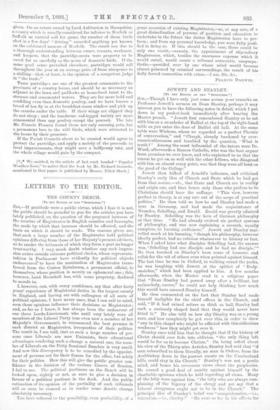LETTERS TO THE EDITOR.
THE COUNTY BENCH.
[To THE EDITOR OF THE "SPECTATOR,"] gratitude were a public virtue, which I fear it is not, the public should be grateful to you for the articles you have lately published, on the question of the proposed increase of the number of Magistrates in English counties and boroughs, the mode by which that increase should be effected, and the basis on which it should be made. The reasons given are, that such a large number of the Magistrates hold political Opinions differing from those of her Majesty's present advisers, as to render the tribunals of which they form a part no longer trustworthy. I very much doubt whether any such impres- sion exists outside extreme political circles, whose represents.- tatives in Parliament have evidently for political objects .endeavoured' to have the nemination of Magistrates trans- ferred from the Custos Rotulorum, a permanent official, to themselves, whose position is merely an ephemeral one ; this, however, Lord Herschell has, with some propriety, declined to accede to.
I, however, can, with every confidence, say that after forty years' experience of Magisterial duties in the largest county in England, and having sat with colleagues of all sorts of political opinions, I have never once, that I can call to mind, seen these opinions influence their decisions as Magistrates; and, as far as I know, it has always been the endeavour of our three Lords-Lieutenant, who until very lately were all members of the Liberal Party (one even now a member of her Majesty's Government), to recommend the best persons in each district as Magistrates, irrespective of their politics. The result is, I am told, that as such a large number of per- sons once Liberals are now Unionists, their educational advantages rendering such a change a natural one, the num- ber of Liberals on the Petty Sessional Benches is very small. And now this discrepancy is to be remedied by the appoint- ment of persons not for their fitness for the office, but solely for their politics. How this will give the public greater con- fidence in the decision of the various Courts of Session, I fail to see. The political partisans on the Bench will be looked upon, rightly or not, as sure to give a decision in favour of a political partisan in the dock. And the public estimation of its opinion of the partiality of such tribunals will so soon be evinced as to render some drastic change absolutely necessary.
You have referred to the possibility, even probability, of a great secession of existing Magistrates,—or, at any rate, of a great disinclination of persons of position and education to undertake in the future the duties Magistrates have to per- form ; and from my personal knowledge, you were fully justi- fied in doing so. If this should be the case, there could be only one result,—namely, the appointment of stipendiary Magistrates, which, besides the enormous expense which it would entail, would create a tribunal autocratic, unsympa- thetic,—nresided over by one whose mind would become almost poisoned by criminal surroundings, the result of hie daily forced connection with crime.—I am, Sir, /te.,
FRANCIS DARWIN.






































 Previous page
Previous page